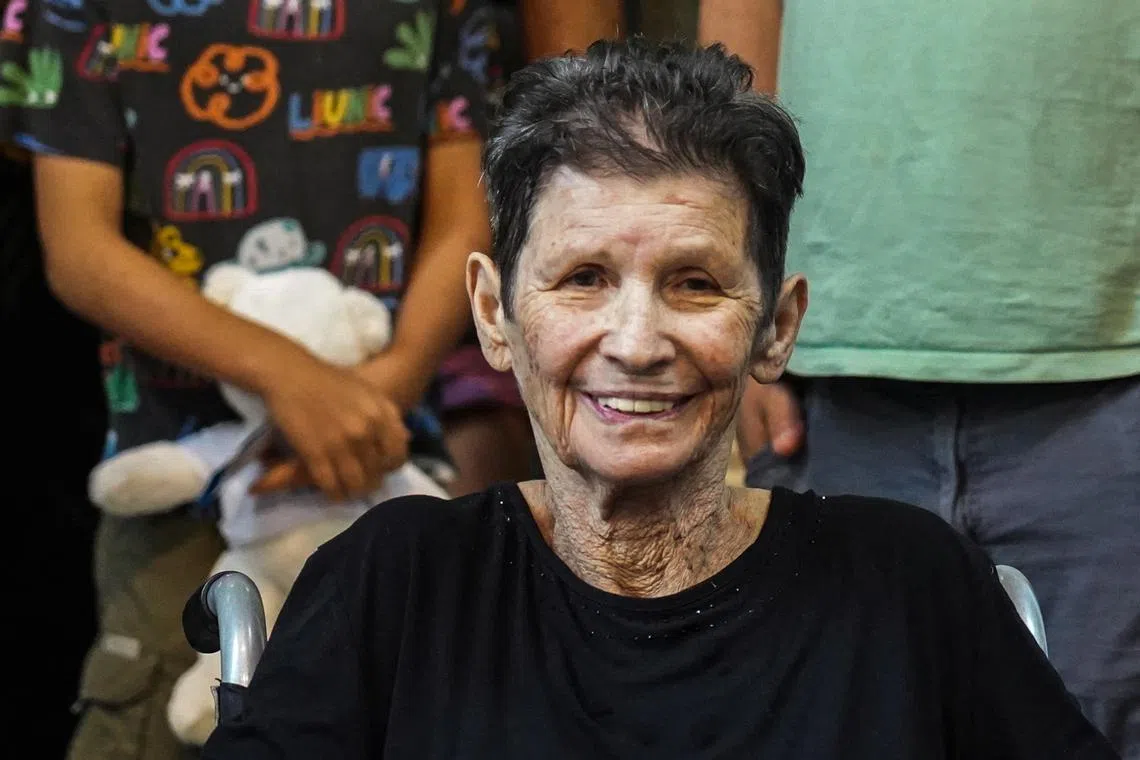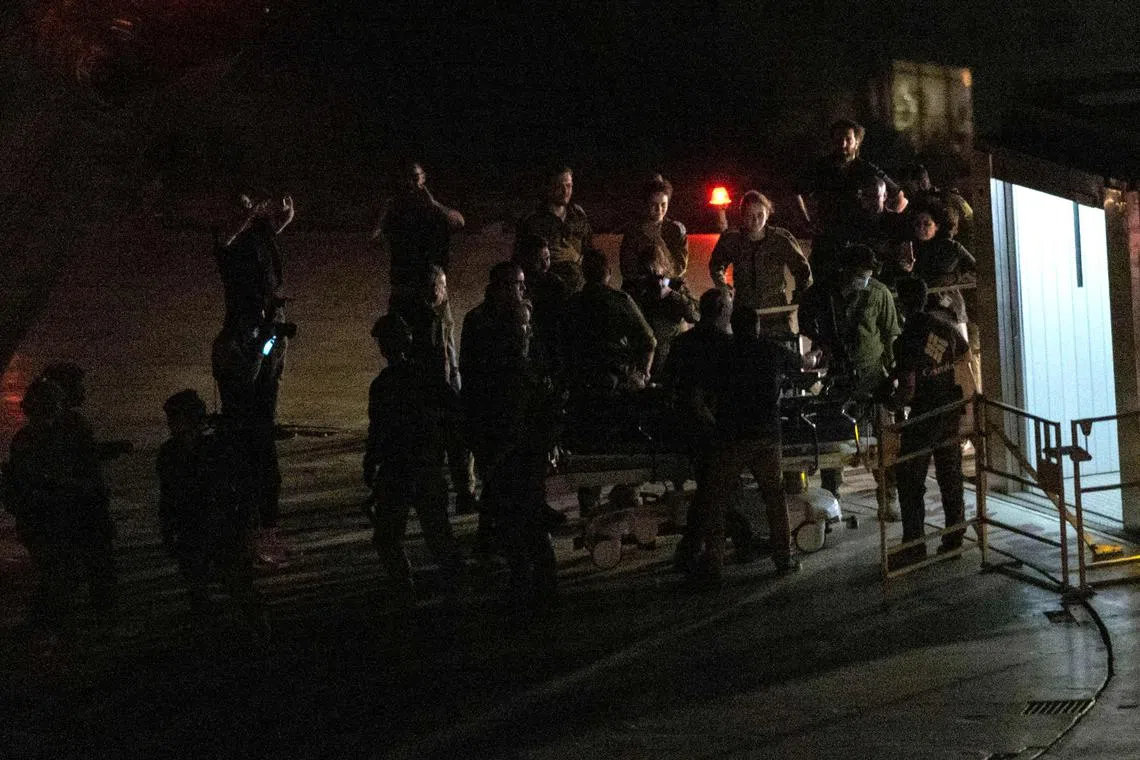Beaten when being taken hostage, freed Israeli woman says she was treated well in Gaza
Sign up now: Get ST's newsletters delivered to your inbox

Mrs Yocheved Lifshitz told reporters that a doctor visited her while she was held in a network of tunnels within Gaza.
PHOTO: REUTERS
JERUSALEM – An elderly Israeli hostage who was released by Hamas overnight said she was beaten by militants as she was taken into Gaza on Oct 7,
Mrs Yocheved Lifshitz, 85, was one of two women freed late on Monday, leaving around 220 hostages still in the hands of Hamas.
“I’ve been through hell, we didn’t think or know we would get to this situation,” she told reporters, seated in a wheelchair outside the Tel Aviv hospital where she was taken following her release.
Looking frail, Mrs Lifshitz said she was put on a motorbike and driven from her kibbutz into nearby Gaza.
“When I was on the bike, my head was on one side and the rest of my body on the other side. The young men hit me on the way. They didn’t break my ribs, but it was painful, and I had difficulty breathing.”
Once in Gaza, she said her captors took her into tunnels that she compared with a spider’s web, and treated her well.
Mrs Lifshitz said a doctor had visited her and made sure she and other hostages received the same sort of medicines they had been taking in Israel.
A group of five people from her kibbutz were held together, each with an individual guard who stayed with them 24 hours a day.
She said the Israeli military had not taken the threat of Hamas seriously enough, and that the costly security fence meant to keep militants out “didn’t help at all”.
“We were left to fend for ourselves,” she added.
The Palestinian militant group Hamas said they released Mrs Lifshitz and a second woman, Ms Nurit Cooper, 79, on health grounds, after taking them and more than 200 others as hostages during an Oct 7 gun rampage in Israel, in which the militants killed more than 1,400 people.
Mrs Lifshitz described her captors as “very friendly” and “very courteous” people who had organised well in advance for taking hostages.
“They seemed ready for this, they prepared for a long time, they had everything that men and women needed, including shampoo,” she told journalists.
“We ate the same food they did – pitas with cream cheese, melted cheese, cucumbers. That was a meal for an entire day.”
Mrs Lifshitz is a peace activist, who together with her husband helped sick Palestinians in Gaza get to hospital for years, her grandson said.
She and her 83-year-old husband Oded were kidnapped from their home at the Nir Oz kibbutz, close to the border with Gaza in southern Israel, the Israeli Prime Minister’s Office said late on Monday. Her husband remained captive, it added.
“They are human rights activists, peace activists for all their life,” grandson Daniel Lifshitz told Reuters in Tel Aviv before the release was confirmed.
“For more than a decade, they took… sick Palestinians from the Gaza Strip, not from the West Bank, from the Gaza Strip every week from the Erez border to the hospitals in Israel to get treatment for their disease, for cancer, for anything.”
Hamas posted a video on its Telegram page appearing to show Mrs Lifshitz being handed over to workers with the International Committee of the Red Cross (ICRC), which said it helped transport them out of Gaza.
In the video, a man carrying a long gun and wearing a bulletproof vest emblazoned with a Hamas flag escorts Mrs Lifshitz to a white ICRC van. Before entering the van, she reaches her hand out to the man and tells him “salam”, Arabic for peace.
In a message, Mrs Lifshitz’s daughter Sharon in London wrote: “While I cannot put into words the relief that she is now safe, I will remain focused on securing the release of my father and all those – some 200 innocent people – who remain hostages in Gaza.”

Israeli hostages Nurit Yitzhak and Yocheved Lifshitz arriving to Tel Aviv Sourasky Medical Center in Tel Aviv, Israel on Oct 24.
PHOTO: AFP
The two women were the third and fourth hostages to be freed. On Friday, Hamas released an American woman and her daughter.
At least 5,791 Palestinians have been killed in two weeks of Israeli strikes, including 2,360 children, the Hamas-run Health Ministry said.
Prisoner swop dilemma
As Israel’s preparations continue for an expected invasion of the Gaza Strip, many families of hostages seized by Hamas are pleading with the government to rein in the war effort and instead negotiate the release of their loved ones.
Highlighting the appalling dilemma facing the country, other relatives warn mediation could take years.
They say their best hope lies with the military, hoping ground forces could find the missing men, women and children before it is too late.
Israeli troops could enter Gaza at any moment, but many families are urging Israeli Prime Minister Benjamin Netanyahu to focus solely on the hostages.
“This should be the top priority, not to destroy Hamas, not to control Gaza and not anything else,” said Mr Noam Alon, the boyfriend of Ms Inbar Haiman, a 27-year-old artist who was abducted.
Family support groups are holding daily protests outside Mr Netanyahu’s office in Tel Aviv to keep the fate of the captives in the spotlight.
“We need to talk to Hamas. We can’t always resort to war. We have so many Palestinian prisoners we can swop for our people,” activist Carmel Gorni, whose cousin was killed during Hamas’ assault, said.
Not all the families agree. Some expressed doubts over whether their relatives would survive prolonged captivity and thought an invasion was inevitable.
Mr Jonathan Dekel-Chen, whose 35-year-old son Sagui is believed to have been kidnapped, said Hamas has to be dealt with “now”. But, he also thinks the army has to make rescuing the hostages the priority of any military campaign.
Hamas has suggested the hostages could be swopped for some 6,000 Palestinians held in Israeli prisons. But Israeli security experts have questioned whether such a deal could ever happen, even if the government were willing to consider it.
“Hamas isn’t stupid. They won’t release the hostages all at once. They’ll stretch this out over five years,” Mr Giora Eiland, a former head of the national security council, told 103FM radio. REUTERS


